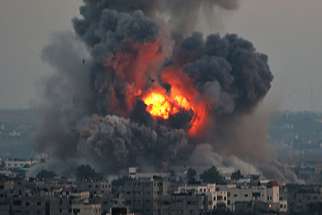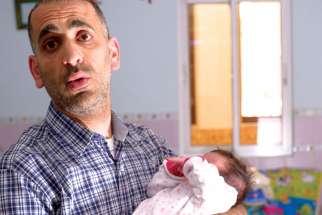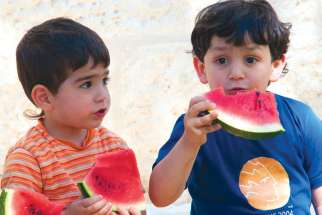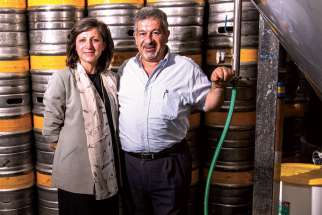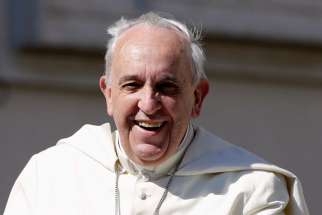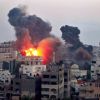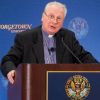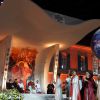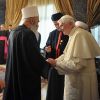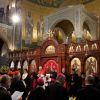While the violence escalates in Israel and Gaza, a movement is taking hold that unites Jews, Muslims and others in a campaign for peace.
Some fear what religion is doing to Middle East
I met a man in Bethlehem who has dedicated his life to compassion, justice, enlightenment and hope. He respects God and tradition and loves the poorest and the weakest among human beings. And he refuses to go to Church.
Christians ‘drowning in a sea of Muslims’
BETHLEHEM - The Vatican has been increasingly concerned about the possibility the Middle East will become a kind of Disneyland for Christians, full of interesting Christian history, architecture and archeology that will attract tourists, but virtually empty of Christians.
Last Christians standing
TAYBEH, ISRAEL - Christians in Taybeh know they are special — unique in fact. Taybeh is the last fully and completely Christian village in the Middle East.
VATICAN CITY - Pope Francis will be accompanied on his first visit to the Middle East by Argentine Rabbi Abraham Skorka and Muslim leader Omar Abboud — two friends from Buenos Aires.
Keys to peace
As this editorial is being written, the guns are silent in Israel and Gaza. But for how long? Hours, days, weeks? Maybe months, at best?
Can Christianity survive in its birthplace?
It is very difficult to make sense of the latest violence in the Middle East. And as we embark on another Advent season, it makes one wonder about the long-term viability of Christian communities in the Church’s birthplace in the Middle East, whether Palestine, Israel, Syria, Iraq or elsewhere in the region.
Pope appeals for peace in Mideast, greets pilgrims from four continents
VATICAN CITY - Greeting hundreds of Christians from Lebanon, Pope Benedict XVI encouraged their presence in the Middle East and launched a fresh appeal for peace in the region.
WASHINGTON - Some of Egypt's Christians feel uncomfortable with Islamists in power, but there is greater freedom of speech than before the revolution, said the Pope's ambassador to the Middle Eastern country.
"I think there is a greater freedom now, though they accuse the present regime of also clamping down on people, on trying to control the press ... so they say that the president is becoming a pharaoh," the Vatican nuncio, Archbishop Michael Fitzgerald, told Catholic News Service.
"Christians are feeling uncomfortable and certainly the Salafi group," an ultraconservative sect of Islam, "is showing ... disrespect for Christians," he said during a mid-October visit to Washington. "There are complaints and, I would say, they are genuine complaints."
The archbishop said that often what begins as a conflict over property or family affairs turns religious and "ends up with people having their houses burned or their shops destroyed or their place of worship also attacked."
"It's easy to arouse a group of Muslims against the Christians, and there can be also a reaction on the Christian side," he said, adding, "The thing is that people are rather hot-tempered and they don't reason very much before they react."
When there is a problem, he said, Christians feel "that the security forces don't come in time, they always come late, and, very often, they hold reconciliation sessions and the Christians are always the losers.
"They would prefer to have people brought to trial and to be condemned ... to have their full rights," he said.
After Egyptian President Hosni Mubarak was ousted in February 2011, an Egyptian military council assumed broad powers. Sixteen months later, Mohammed Morsi of the Islamist Muslim Brotherhood was elected Egypt's new president.
During those 16 months, the Church sponsored seminars and lectures to encourage awareness of parties and issues. Cairo's justice and peace commission also sponsored candidate forums, the archbishop said.
Morsi has finished his first 100 days in office, and critics say he has not kept most of his promises about what he would achieve in that time.
Egyptians also are awaiting a court ruling on whether the assembly drafting the country's new constitution is legal. Members of Parliament chose members of the assembly, and some Egyptians argue that the assembly does not reflect all sectors of society. The court has said it will issue its ruling Oct. 23.
Fitzgerald said these were signs of emerging democracy.
"Certainly people are ready to criticize the president and to say 'Look, you promised many things, and you're not fulfilling your promises,' ” he said, noting that probably would not have happened before the revolution.
He said he is trying to encourage Christians to participate in the new democracy, although some express fear for what the future holds for their children.
"My own message to them has been, look, there is a new spirit of democracy, and you have to build on that. Though the Islamists are in power now, this doesn't mean to say that they will always be in power. This depends on you," he said.
Emissary of hope
As war raged in Syria and an anti-Muslim film ignited violence across the Arab world, Pope Benedict calmly arrived last week in Lebanon as a “pilgrim of peace.”
The 85-year-old pontiff would have been excused if, citing age and security concerns, he’d postponed this trip. During his three-day stay, 25 people were injured and a man killed in Lebanon’s second largest city, Tripoli, during protests aimed at an American film that mocks Islam. The day after he left, missiles from Syrian jets hit Lebanese territory. The region, habitually unsafe, is particularly dangerous right now.
The purpose of the trip was to officially endorse the Apostolic Exhortation that was drafted following the 2010 Synod of Bishops for the Middle East. That task could have been accomplished in the Vatican, of course, and transmitted live worldwide by video-conferencing and Internet technology. Yet the Pope dismissed that option.
Instead, he made the right and courageous decision to stand beside the Christians of the region and, by his physical presence, acknowledge the hardships they endure by living in nations that are often hostile to Christianity. That simple act alone says much about the Pope. Then, addressing some 20,000 young people from several Middle East countries, he urged them to be the vanguard to keep Christianity alive in the lands of its birth.
Middle East Christians, facing social and economic discrimination and seeking safety for their families, have been emigrating in droves to Europe and North America. At the current pace, Christianity might virtually disappear from the region in a generation. It is asking much of young Christians to endure financial and religious hardship, but that is exactly what the Pope implored. To be effective, the message had to be delivered in person.
“I am aware of the difficulties you face daily, on account of instability and a lack of security, and your sense of being alone and on the margins,” he said. But, he added, “You are meant to be protagonists of your country’s future.”
The Pope’s Apostolic Exhortation lays a common-sense framework for Middle East Christianity to endure. It emphasizes dialogue, respect, equality, tolerance and forgiveness among Christians, Muslims and Jews, while denouncing secularism and fundamentalism. The Pope urged young people to never be afraid or ashamed of being Christian and he affirmed their right to religious liberty, to live publicly as Christians and to participate fully in civil life.
The Pope arrived in Lebanon as a pilgrim of peace but departed as an emissary of inspiration and hope. He ignored the latest regional upheaval and chose boldly to stand among the anxious Christians to let them know in person that he will not abandon them. That may have been the most important message of all.
Pope calls Middle Eastern Christians to promote peace through service
BEIRUT - Pope Benedict XVI acknowledged the suffering of Christians in the Middle East, reassuring them and urging them to promote peace through religiously inspired service to their societies.
"Your sufferings are not in vain," the pope told a crowd of at least 350,000 at a sweltering outdoor Mass at Beirut's City Center Waterfront Sept. 16. "Remain ever hopeful because of Christ."
In his homily, Pope Benedict commented on the day's reading from the Gospel of St. Mark, in which Jesus foretells his death and resurrection. Jesus is a "Messiah who suffers," the pope said, "a Messiah who serves, and not some triumphant political savior."
Speaking in a region riven by sectarian politics, where party loyalties are often determined by religious affiliation, the pope warned that people can invoke Jesus to "advance agendas which are not his, to raise false temporal hopes in his regard."
Pope Benedict told his listeners, whose travails of war and economic insecurity he had acknowledged repeatedly throughout his visit, that Christianity is essentially a faith of redemptive suffering.
"Following Jesus means taking up one's cross and following in his footsteps along a difficult path which leads not to earthly power or glory but, if necessary, to self-abandonment, to losing one's life for Christ and the Gospel in order to save it," he said.
Yet Pope Benedict also cited another of the day's Mass readings, the epistle of St. James, to emphasize the spiritual value of "concrete actions" and works, concluding that "service is a fundamental element" of Christian identity.
Addressing a region where Christian-run social services, including schools and health care facilities, are extensively used by the Muslim majority, the pope stressed the importance of "serving the poor, the outcast and the suffering," and called on Christians to be "servants of peace and reconciliation in the Middle East."
"This is an essential testimony which Christians must render here, in cooperation with all people of good will," Pope Benedict said.
During the homily, the only sound was the pope's voice and its echo from the loudspeakers. Many people leaned over and bowed their heads with eyes closed, so they could concentrate more deeply.
Following the Mass, the pope formally presented patriarchs and bishops of the Middle East with a document of his reflections on the 2010 special Synod of Bishops, which was dedicated to the region's Christians. In the 90-page document, called an apostolic exhortation, the pope called for religious freedom and warned of the dangers of fundamentalism.
Sheltered from the sun only by white baseball caps and the occasional umbrella, people had already packed the city's central district by 8 a.m., almost an hour-and-a-half before the pope arrived in the popemobile, which took him to the foot of the altar. In temperatures that rose into the high 80s, the pope celebrated Mass under a canopy while bishops and patriarchs on either side wiped their brows and fanned themselves with programs.
Aside from the complimentary white pope caps, people in the crowd improvised versions of sun protection with torn pieces of corrugated boxes tied around heads and papal and Lebanese flags worn as bandanas.
George Srour, 38, estimated that 20,000 people came from Zahle in a convoy of chartered school buses, leaving at 5 a.m. for the 10 a.m. Mass.
"We Christians must be united and participate" in the pope's visit, Srour told Catholic News Service, "otherwise there will be no more Lebanon. It will become like Iraq, and now Syria, with all the Christians leaving."
- - -
Contributing to this story was Doreen Abi Raad.
Pope urges Middle East Christian youth to stay and make peace
BKERKE, Lebanon - Pope Benedict XVI urged young Christians in the Middle East not to flee violence and economic insecurity through emigration, but to draw strength from their faith and make peace in their troubled region.
The pope spoke to some 20,000 young people from several Middle Eastern countries gathered outside the residence of the Maronite patriarch in Bkerke in a celebration that included fireworks, spotlights, singing and prayer.
The crowd began to form hours before Pope Benedict arrived in the popemobile a little after 6 p.m. After passing through the metal detector and the gates of Bkerke, visitors were greeted by Scouts who gave them an olive branch to wave to welcome the pope and a knapsack containing water, snacks, an Arabic Bible and the new edition of the youth catechism -- "YouCat," a gift from Pope Benedict.
A giant rosary fashioned from yellow and blue balloons hovered over the crowd, its colors blending in with the cloudless sky and Mediterranean Sea below the hillside.
Pope Benedict asked young Christians, whose population is diminishing across the Middle East, not to abandon their homelands.
"Not even unemployment and uncertainty should lead you to taste the bitter sweetness of emigration, which involves an uprooting and a separation for the sake of an uncertain future," he said. "You are meant to be protagonists of your country's future and to take your place in society and in the church."
Warning against escapism, the pope urged his listeners not to "take refuge in parallel worlds like those, for example, of the various narcotics or the bleak world of pornography."
He acknowledged that online social networks are interesting, but said they "can quite easily lead to addiction and confusion between the real and the virtual." He called money a "tyrannical idol which blinds to the point of stifling the person at the heart."
Offering encouragement, the pope invoked the inspiration of the first Christians, inhabitants of the Middle East who "lived in troubled times and their faith was the source of their courage and their witness."
"Courageously resist everything opposed to life: abortion, violence, rejection of and contempt for others, injustice and war," Pope Benedict said. "In this way you will spread peace all around you."
Maronite Patriarch Bechara Rai, in his welcoming speech, told the pope, "These youths suffer from social, political and economic crises that negatively affect their faith and cause some of them to lose the real meaning of their Christian identity."
Two youths spoke to the pope, basing their remarks on input from young Christians from all over Lebanon.
The Middle East's young Christians, they said, "yearn for peace and dream of a future without wars, a future where we will play an active role, where we work with our brothers, the young people of different religions to build a civilization of love ... homelands where human rights and freedom are respected, where each one's dignity is protected."
"We are looking for a culture of peace," they said, calling for the condemnation of violence. "We want to be living bridges, mediators of dialogue and cooperation."
The crowd cheered when the pope said he did not forget the Syrian people, stressing that he is always praying for them and that he is glad there were some Syrian people at the gathering.
Syria's civil war has left thousands dead and displaced hundreds of thousands of refugees since March 2011.
"The pope is saddened by your sufferings and your grief," he said, his first public reference to the Syrian conflict since he arrived in Lebanon. "It is time for Muslims and Christians to come together so as to put an end to violence and war."
Pope Benedict also offered a word of thanks to the Muslims in attendance, urging them to work with Christians to build up the region.
"Muslims and Christians, Islam and Christianity, can live side by side without hatred, with respect for the beliefs of each person, so as to build together a free and humane society," the pope said.
After young people presented the prayer intentions, fireworks erupted from all corners of Bkerke, taking the pope by surprise. Sparklers cascaded from the roof of the outdoor chapel facing the stage, lighting up the sky.
At the conclusion of the gathering, spotlights atop the chapel illuminated the courtyard. The huge inflatable globe that had been placed earlier under the cross was sent airborne, with young people bouncing it like a volleyball.
A light show flashed "take-home" reminders on the walls: "love," "missionaries of peace," "pray."
Pope says religious freedom is necessary for Middle East peace
BEIRUT - Peace will not come to the Middle East until its nations enjoy religious freedom, since only the free practice of faith can inspire the region's diverse peoples to unite around basic human values, Pope Benedict XVI said Sept. 15.
The pope addressed a multifaith gathering of Lebanon's political, religious and cultural leaders at the presidential palace in Baabda on the second day of a three-day visit to the country.
Pope Benedict's travels coincided with a wave of often-violent protests -- prompted by an American-made film denigrating Islam -- in at least a dozen Muslim countries. On Sept. 14, protesters denounced the papal visit during a demonstration in the Lebanese city of Tripoli; one person died and 25 were wounded in a clash that followed.
In his speech to the nation's leaders, the pope did not refer specifically to any of the region's many past or present conflicts, including the current civil war in neighboring Syria, but noted that the "centuries-old mix" of cultures and religions in the Middle East has not always been peaceful.
Peace requires a pluralistic society based on "mutual respect, a desire to know the other, and continuous dialogue," the pope said, and such dialogue in turn depends on consciousness of sharing fundamental human values, cherished and sustained in common by different religions. Thus, he argued, "religious freedom is the basic right on which many rights depend."
The pope spoke after meeting privately with Lebanon's president and prime minister, the president of parliament, and leaders of the country's four major Muslim communities: Sunni, Shiite, Druze and Alawite. Lebanon's population is estimated to be about 60 percent Muslim and almost 40 percent Christian, with both groups divided into many smaller communities.
In an apparent reference to the many Middle Eastern countries that restrict the practice or expression of religions other than Islam, the pope said that freedom must go beyond "what nowadays passes for tolerance," which he said "does not eliminate cases of discrimination" but sometimes "even reinforces them."
"The freedom to profess and practice one's religion without danger to life and liberty must be possible to everyone," he said.
Those remarks echoed portions of a document that Pope Benedict signed the previous night in Harissa and was to present formally Sept. 16 at an outdoor Mass in Beirut. The document is a collection of his reflections on the 2010 special Synod of Bishops dedicated to Christians in the Middle East.
In his talk in Baabda, the pope did not explicitly address the topic of religiously inspired violence, but included a single reference to terrorism and the assertion that "authentic faith does not lead to death."
He also said that peace requires a shared respect for human life and dignity. Those values are undermined not only by war, he said, but by a range of social ills, including unemployment, corruption, "different forms of trafficking," and an "economic and financial mindset which would subordinate 'being' to 'having.'"
The pope also warned against ideologies that he said "undermine the foundations of our society" by "questioning, directly or indirectly, or even before the law, the inalienable value of each person and the natural foundation of the family" -- an apparent reference to abortion, euthanasia and same-sex marriage.
In response to such threats, Pope Benedict said, political and religious leaders should promote a "culture of peace" through education, which he said would encourage a "conversion of heart" characterized above all by a willingness to forgive.
"Only forgiveness, given and received," the pope said, "can lay lasting foundations for reconciliation and universal peace."
Pope Benedict XVI urges interfaith dialogue in Middle East
BEIRUT (CNS) -- Pope Benedict XVI signed a major document calling on Catholics in the Middle East to engage in dialogue with Orthodox, Jewish and Muslim neighbors, but also to affirm and defend their right to live freely in the region where Christianity was born.
In a ceremony at the Melkite Catholic Basilica of St. Paul in Harissa Sept. 14, Pope Benedict signed the 90-page document of his reflections on the 2010 special Synod of Bishops, which was dedicated to Christians in the Middle East. He was to formally present the document Sept. 16 at an outdoor Mass in Beirut.
A section dedicated to interreligious dialogue encouraged Christians to "esteem" the region's dominant religion, Islam, lamenting that "both sides have used doctrinal differences as a pretext for justifying, in the name of religion, acts of intolerance, discrimination, marginalization and even of persecution."
Yet in a reflection of the precarious position of Christians in most of the region today, where they frequently experience negative legal and social discrimination, the pope called for Arab societies to "move beyond tolerance to religious freedom."
The "pinnacle of all other freedoms," religious freedom is a "sacred and inalienable right," which includes the "freedom to choose the religion which one judges to be true and to manifest one's beliefs in public," the pope wrote.
It is a civil crime in some Muslim countries for Muslims to convert to another faith and, in Saudi Arabia, Catholic priests have been arrested for celebrating Mass, even in private.
The papal document, called an apostolic exhortation, denounced "religious fundamentalism" as the opposite extreme of the secularization that Pope Benedict has often criticized in the context of contemporary Western society.
Fundamentalism, which "afflicts all religious communities," thrives on "economic and political instability, a readiness on the part of some to manipulate others, and a defective understanding of religion," the pope wrote. "It wants to gain power, at times violently, over individual consciences, and over religion itself, for political reasons."
Many Christians in the Middle East have expressed growing alarm at the rise of Islamist extremism, especially since the so-called Arab Spring democracy movement has toppled or threatened secular regimes that guaranteed religious minorities the freedom to practice their faith.
Earlier in the day, the pope told reporters accompanying him on the plane from Rome that the Arab Spring represented positive aspirations for democracy and liberty and hence a "renewed Arab identity." But he warned against the danger of forgetting that "human liberty is always a shared reality," and consequently failing to protect the rights of Christian minorities in Muslim countries.
The apostolic exhortation criticized another aspect of social reality in the Middle East by denouncing the "wide variety of forms of discrimination" against women in the region.
"In recognition of their innate inclination to love and protect human life, and paying tribute to their specific contribution to education, health care, humanitarian work and the apostolic life," Pope Benedict wrote, "I believe that women should play, and be allowed to play, a greater part in public and ecclesial life."
In his speech at the document's signing, Pope Benedict observed that Sept. 14 was the feast of the Exaltation of Holy Cross, a celebration associated with the Emperor Constantine the Great, who in the year 313 granted religious freedom in the Roman Empire and was later baptized.
The pope urged Christians in the Middle East to "act concretely ... in a way like that of the Emperor Constantine, who could bear witness and bring Christians forth from discrimination to enable them openly and freely to live their faith in Christ crucified, dead and risen for the salvation of all."
While the pope signed the document in an atmosphere of interreligious harmony, with Orthodox, Muslim and Druze leaders in the attendance at the basilica, the same day brought an outburst of religiously inspired violence to Lebanon.
During a protest against the American-made anti-Muslim film that prompted demonstrations in Libya, Egypt and Yemen earlier in the week, a group attempted to storm a Lebanese government building in the northern city of Tripoli. The resulting clashes left one person dead and 25 wounded, local media reported. According to Voice of Lebanon radio, Lebanese army troops were deployed to Tripoli to prevent further violence.
Mohammad Samak, the Muslim secretary-general of Lebanon's Christian-Muslim Committee for Dialogue, told Catholic News Service that the violence had nothing to do with the pope's visit.
"All Muslim leaders and Muslim organizations -- political and religious -- they are all welcoming the Holy Father and welcoming his visit," Samak said. "I hope his visit will give more credibility to what we have affirmed as the message of Lebanon -- a country of conviviality between Christians and Muslims who are living peacefully and in harmony together for hundreds of years now."
Bishop Joseph Mouawad, vicar of Lebanon's Maronite Patriarchate, told CNS that the apostolic exhortation represents "a roadmap for Christians of the Middle East to live their renewal at all levels, especially at the level of communion."
The exhortation will also be a call to dialogue, he said, especially between Christians and Muslims.
Chaldean Archbishop Louis Sako of Kirkuk, Iraq, said now church leaders in each Mideast country must "work on how to translate the exhortation into real life in our communities and also in our Muslim and Christian relationships."
- - -
Contributing to this story was Doreen Abi Raad.
Pope Benedict's visit can bring new hope to Middle East
As war bears down from all sides, Lebanese Christians are waiting for their own Arab Spring. For the Middle East’s most Christian country, spring arrives with Pope Benedict’s visit to Beirut Sept. 14-16.
“The Pope’s visit comes as an important message of peace, not only for the Christians but also for the Muslims of the region,” Issam Bishara, Catholic Near East Welfare Association regional director, told The Catholic Register in an e-mail from Beirut.
With much larger Syria fully engulfed in civil and sectarian war to the north, east and south, fighting has already slipped across the border into Lebanon.
“Lebanon cannot but be affected by what is going on in Syria,” Bishara said.
Despite the raging war in Syria, Lebanese and Vatican officials expect the papal visit to proceed on schedule.
“I know that the visit is very well prepared and the security is under the control of the presidential guard,” said Bishara.
In Beirut on Sept. 15, Pope Benedict XVI will deliver an exhortation based on the 2010 Synod on the Middle East in Rome. The synod gathered bishops and patriarchs of the region with selected bishops from around the world to discuss the future of Christianity in the land of its birth. With a diminishing Christian population, deep divisions along religious lines and the increasing dominance of politicized forms of Islam, the bishops called for an enlarged secularism with room for all religious voices and institutions to contribute to society. Such a transformation has to begin with ideals of citizenship which transcend local allegiances of tribe, clan and family, said the bishops.
Keeping Lebanon at peace is critical for the future of the whole region, said Fr. Youssef Chedid, associate pastor at Toronto’s Our Lady of Lebanon parish.
“Lebanon is a key country in the (Middle) East in which everything that happens in Lebanon will have implications for the whole area, and vice versa,” he said.
Chedid was an expert advisor at the 2010 Synod on the Middle East. He views the Pope’s Sept. 15 exhortation as an opportunity to re-orient the Arab Spring.
“It’s more an autumn than a spring (so far),” said Chedid. “It hasn’t brought good news. It hasn’t brought events of social progress. It didn’t get better after all these revolutions.”
Pope Benedict XVI’s exhortation is an opportunity to change the channel on entrenched regional conflicts, said Chedid.
“We would hope that this exhortation will bring to the whole Middle East a new hope,” he said.
A form of secularism that respects and values the contributions of all religions, where majorities and minorities can speak as equals, is the best hope for Middle Eastern Christians, said Chedid.
“We don’t want to be considered second rate. We don’t want to live in a totalitarian regime. We want democracy that will care for all the social groups,” he said.
Chedid grew up in Lebanon under the rule of the militias. He worries that importing a war from Syria repeats the same mistake of Lebanon in the 1980s.
“It’s the war of outside parties with everyone supporting outside parties,” he said. “They’re doing their fight on our land.”
Countering the tendency for regional wars to seep into Lebanon, the Pope has the opportunity to export a vision of peace from Lebanon to the region, according to Chedid.
“Our hope after the visit of the Pope to Lebanon is that through Lebanon he will speak to all the Arab countries and he will help us to understand each other — to help us to have a good dialogue, not between the strong party and the weak party but between all of us as believers. We will have a dialogue that will care about everything on the social level and also the political level.”
This message matters when gun battles break out between Sunni and Alawite militants across Syria Street in Tripoli, Lebanon’s second largest city, said Bishara. The Alawites are loyal to the Assad family and its regime in Damascus. As in Syria, the Sunnis line up with rebel forces.
It isn’t just Lebanon’s Muslims who are picking sides in Syria’s war.
“Christians in Lebanon have already chosen sides. One group supports General (Michel) Aoun (founder of the Free Lebanon Party) whose allies are the Shiite Hezbollah and Speaker of the House Nabih Berri,” said Bishara. “Another Christian group is loyal to the chief of the Lebanese Forces Samir Geagea, supported by the Sunnite political leaders headed by the previous Prime Minister Saad Al-Hariri.”
Aoun’s group is part of the March 8 Movement allied with Syria. Hariri is leader of the March 14 Alliance which opposes Syrian interference in Lebanon.
“The Church leadership in Lebanon, especially Maronite Patriarch Bechara Boutros al-Rahi, has been trying to unify this schism for years — but with very little success,” said Bishara.
So far, all parties want to avoid the kind of militia-led politics that made Lebanon a failed state in the 1980s.
“Going back to the years of war when militias were in charge of Lebanon is very unlikely,” said Bishara. “The leadership of the different political groups have all experienced the devastation resulting from total loss of order by government and also know well that in the end they will all lose.”
Al-Rahi condemned the “so-called military councils of clans and sects” as fighting broke out in Tripoli. Al-Rahi is calling on Lebanon’s central government to exercise full control and maintain its independence.


